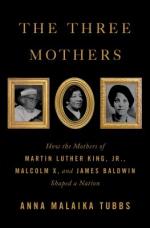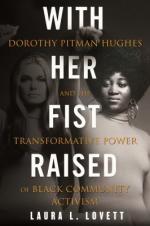February 20, 2021 | kasarak
Determined mothers.
Tenacious activists.
Formidable women.
Powerful believers.
Those characteristics and the stories that tell readers how they were formed are available in the new history and biography books listed below.
Let us celebrate them.
In her groundbreaking and essential debut The Three Mothers, scholar Anna Malaika Tubbs celebrates Black motherhood by telling the story of the three women who raised and shaped some of America's most pivotal heroes: Martin Luther King, Jr., Malcolm X, and James Baldwin. Much has been written about Berdis Baldwin's son James, about Alberta King's son Martin Luther, and Louise Little's son Malcolm. But virtually nothing has been said about the extraordinary women who raised them, who were all born at the beginning of the 20th century and forced to contend with the prejudices of Jim Crow as Black women. Berdis, Alberta, and Louise passed their knowledge to their children with the hope of helping them to survive in a society that would deny their humanity from the very beginning-from Louise teaching her children about their activist roots, to Berdis encouraging James to express himself through writing, to Alberta basing all of her lessons in faith and social justice. These women used their strength and motherhood to push their children toward greatness, all with a conviction that every human being deserves dignity and respect despite the rampant discrimination they faced. These three mothers taught resistance and a fundamental belief in the worth of Black people to their sons, even when these beliefs flew in the face of America's racist practices and led to ramifications for all three families' safety. The fight for equal justice and dignity came above all else for the three mothers. These women, their similarities and differences, as individuals and as mothers, represent a piece of history left untold and a celebration of Black motherhood long overdue.
Dorothy Pitman Hughes was a transformative community organizer in New York City in the 1970s, who shared the stage with Gloria Steinem for five years, captivating audiences around the country. After leaving rural Georgia in the 1950s, she moved to New York, determined to fight for civil rights and equality. Lovett traces Pitman Hughes' transformation into a powerhouse activist determined to take on the needs of her community and build a platform for empowerment. She created lasting change by revitalizing her West Side neighborhood, a community subjected to racial discrimination, with nonexistent childcare and sub-standard housing, in which poverty, drug use, lack of job training, and the effects of the Vietnam War were evident She imagined and then created a high quality child care center which also offered job training, adult education classes, a Youth Action corps, housing assistance and food resources. Pitman Hughes' realization that the area could be revitalized by actively engaging and including the community was prescient and is startlingly relevant. As her stature and influence grew to a national level, Pitman Hughes went from the West Side to spending several years traversing the country with Steinem and educating people about feminism, childcare, and race. Pitman Hughes's community activism was transformed when she moved to Harlem in the 1970s to counter gentrification. She bought the franchise to the Miss Greater New York City pageant in order to demonstrate that black was beautiful. She also opened an office supply store and became a powerful voice for Black women entrepreneurs and Black-owned business only to be thwarted by plans for economic development that favored national chains over local businesses. Throughout every phase of her life, Pitman Hughes' understood the transformative power of activism with the Black community.
Dorothy Pitman Hughes was a transformative community organizer in New York City in the 1970s, who shared the stage with Gloria Steinem for five years, captivating audiences around the country. After leaving rural Georgia in the 1950s, she moved to New York, determined to fight for civil rights and equality. Lovett traces Pitman Hughes' transformation into a powerhouse activist determined to take on the needs of her community and build a platform for empowerment. She created lasting change by revitalizing her West Side neighborhood, a community subjected to racial discrimination, with nonexistent childcare and sub-standard housing, in which poverty, drug use, lack of job training, and the effects of the Vietnam War were evident She imagined and then created a high quality child care center which also offered job training, adult education classes, a Youth Action corps, housing assistance and food resources. Pitman Hughes' realization that the area could be revitalized by actively engaging and including the community was prescient and is startlingly relevant. As her stature and influence grew to a national level, Pitman Hughes went from the West Side to spending several years traversing the country with Steinem and educating people about feminism, childcare, and race. Pitman Hughes's community activism was transformed when she moved to Harlem in the 1970s to counter gentrification. She bought the franchise to the Miss Greater New York City pageant in order to demonstrate that black was beautiful. She also opened an office supply store and became a powerful voice for Black women entrepreneurs and Black-owned business only to be thwarted by plans for economic development that favored national chains over local businesses. Throughout every phase of her life, Pitman Hughes' understood the transformative power of activism with the Black community.
In 2014, northeastern Syria might have been the last place you would expect to find a revolution centered on women's rights. But that year, an all-female militia faced off against ISIS in a little town few had ever heard of: Kobani. By then, the Islamic State had swept across vast swaths of the country, taking town after town and spreading terror as the civil war burned all around it. From that unlikely showdown in Kobani emerged a fighting force that would wage war against ISIS across northern Syria alongside the United States. In the process, these women would spread their own political vision, determined to make women's equality a reality by fighting--house by house, street by street, city by city--the men who bought and sold women.
Based on years of on-the-ground reporting, The Daughters of Kobani is the unforgettable story of the women of the Kurdish militia that improbably became part of the world's best hope for stopping ISIS in Syria. Drawing from hundreds of hours of interviews, bestselling author Gayle Tzemach Lemmon introduces us to the women fighting on the front lines, determined to not only extinguish the terror of ISIS but also prove that women could lead in war and must enjoy equal rights come the peace. In helping to cement the territorial defeat of ISIS, whose savagery toward women astounded the world, these women played a central role in neutralizing the threat the group posed worldwide. In the process they earned the respect--and significant military support--of U.S. Special Operations Forces.
Rigorously reported and powerfully told, The Daughters of Kobani shines a light on a group of women intent on not only defeating the Islamic State on the battlefield but also changing women's lives in their corner of the Middle East and beyond.
In 2014, northeastern Syria might have been the last place you would expect to find a revolution centered on women's rights. But that year, an all-female militia faced off against ISIS in a little town few had ever heard of: Kobani. By then, the Islamic State had swept across vast swaths of the country, taking town after town and spreading terror as the civil war burned all around it. From that unlikely showdown in Kobani emerged a fighting force that would wage war against ISIS across northern Syria alongside the United States. In the process, these women would spread their own political vision, determined to make women's equality a reality by fighting--house by house, street by street, city by city--the men who bought and sold women.
Based on years of on-the-ground reporting, The Daughters of Kobani is the unforgettable story of the women of the Kurdish militia that improbably became part of the world's best hope for stopping ISIS in Syria. Drawing from hundreds of hours of interviews, bestselling author Gayle Tzemach Lemmon introduces us to the women fighting on the front lines, determined to not only extinguish the terror of ISIS but also prove that women could lead in war and must enjoy equal rights come the peace. In helping to cement the territorial defeat of ISIS, whose savagery toward women astounded the world, these women played a central role in neutralizing the threat the group posed worldwide. In the process they earned the respect--and significant military support--of U.S. Special Operations Forces.
Rigorously reported and powerfully told, The Daughters of Kobani shines a light on a group of women intent on not only defeating the Islamic State on the battlefield but also changing women's lives in their corner of the Middle East and beyond.
"Congratulations on the resurrection of your life," a colleague wrote to Emily Rapp Black when she announced the birth of her second child. The line made Rapp Black pause. Her first child, a boy named Ronan, had died from Tay-Sachs disease before he turned three years old, an experience she wrote about in her second book, The Still Point of the Turning World. Since that time, her life had changed utterly: She left the marriage that fractured under the terrible weight of her son's illness, got remarried to a man who she fell in love with while her son was dying, had a flourishing career, and gave birth to a healthy baby girl. But she rejected the idea that she was leaving her old life behind--that she had, in the manner of the mythical phoenix, risen from the ashes and been reborn into a new story, when she still carried so much of her old story with her. More to the point, she wanted to carry it with her. Everyone she met told her she was resilient, strong, courageous in ways they didn't think they could be. But what did those words mean, really?
This book is an attempt to unpack the various notions of resilience that we carry as a culture. Drawing on contemporary psychology, neurology, etymology, literature, art, and self-help, Emily Rapp Black shows how we need a more complex understanding of this concept when applied to stories of loss and healing and overcoming the odds, knowing that we may be asked to rebuild and reimagine our lives at any moment, and often when we least expect it. Interwoven with lyrical, unforgettable personal vignettes from her life as a mother, wife, daughter, friend, and teacher, Rapp Black creates a stunning tapestry that is full of wisdom and insight.





